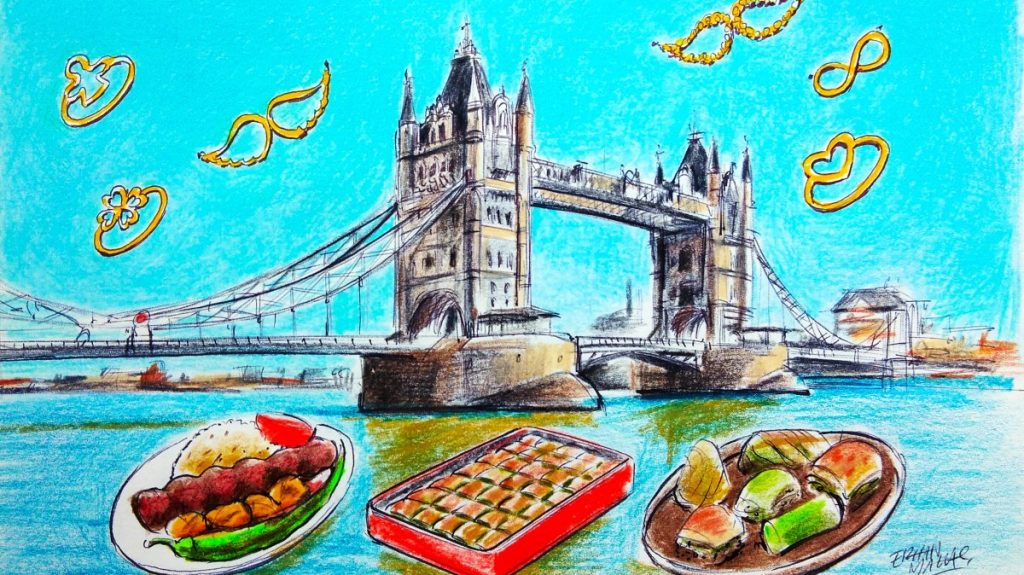In recent years, a quiet revolution has been unfolding – largely unnoticed – on the U.K.’s high streets. From the scent of aromatic kebabs drifting through city centers to the familiar hum of Turkish barbershops in suburban neighborhoods, Turkish enterprises have carved out a dynamic presence in the U.K.’s high streets. But this isn’t just a trend – it’s a reflection of entrepreneurship, cultural exchange and the growing global appreciation for quality and authenticity.
Turkish brands in London are far more than niche businesses serving an expat community. They are cultural ambassadors, reshaping the city’s cosmopolitan identity. From fashion to fine dining, these enterprises blend tradition with modernity, infusing London with a distinct Turkish flair that bridges centuries-old heritage and contemporary sensibilities.
Turkish cuisine, long celebrated in the U.K. for its bold flavors and communal spirit, has won a devoted following. At its heart lies a rich cultural heritage that resonates with British consumers. Take Efes Restaurant & Bar, for instance. Named after the ancient city of Ephesus in Aegean Türkiye, Efes was founded in 1974 by Kazım Akkuş – also known as “Kazım Chef.” Now over 50 years in operation, it’s one of the U.K.’s best-known döner establishments. Efes has become synonymous with Turkish culinary excellence and was even honored by Queen Elizabeth for its contribution to gastronomy.
Another standout example is Sofra, a restaurant chain established by Hüseyin Özer. He began his culinary journey in a humble döner kebab shop in Mayfair before expanding across London. Today, Sofra’s restaurants are recognized by the Michelin Guide, offering British diners a window into Türkiye’s diverse food culture.
While many of these pioneering Turkish businesses began in London, the movement now stretches well beyond kebabs and grills. A new wave of Turkish brands – rooted in Türkiye itself – is now setting up shop in the capital to attract a global clientele. London has become a proving ground for these companies to declare: “We’ve arrived.”
Historically, Turkish brands were often perceived as affordable but unremarkable. That perception is shifting. Today, a growing number of Turkish firms are showcasing luxury, exclusivity and craftsmanship – offering haute cuisine, fine accessories and premium goods to an international audience.
One notable newcomer is Hafız Mustafa 1864, which recently opened its 20th branch in Knightsbridge, directly across from Harrods. Having already expanded from Türkiye to Dubai, the brand now brings a taste of Ottoman elegance to Britain.
Shortly after, Cafer Erol 1807 – a confectionery brand with over 218 years of history – opened its flagship European store just steps away from Harrods. Its colorful windows display and traditional sweets offer visitors a sensory journey to the lively streets of Istanbul.
Then there’s Elvish Honey from Artvin, one of Türkiye’s most exclusive exports. This rare and highly prized honey is now a fixture at Harrods, priced at a staggering 6,000 pounds ($7,758) per kilogram. Harvested in caves in the Black Sea region, it represents the peak of artisanal Turkish production and is now finally being appreciated at its true value.
Karaca, a well-known Turkish homeware brand, has also expanded in London, reinforcing the growing impact of Turkish craftsmanship in the U.K. This marks a turning point: Turkish ceramics, whose roots date back to the Uyghur period of the eighth and ninth centuries, are claiming their rightful place in Britain’s design-conscious homes. It’s not all about British porcelain anymore.
And in the realm of luxury, Kismet by Milka has joined London’s jewelry elite. The brand opened its 16th global store on New Bond Street, securing a 10-year lease for a 1,100-square-foot space alongside some of the world’s most prestigious names. Drawing from Türkiye’s rich trove of natural resources – gold, silver, gemstones, enamel and glass – Kismet’s designs scream design and quality, coming from the land of Ottomans and fit for sultans.
Behind this success lies economic resilience. Turkish firms weathered post-Brexit uncertainty and the COVID-19 pandemic with remarkable agility. Many tapped into established diaspora networks to streamline supply chains, while others capitalized on Britain’s hunger for handcrafted, artisanal goods – like handwoven textiles from Gaziantep or organic olive oil from Ayvalık. These ventures do more than fill storefronts; they create jobs, pay taxes and enrich communities. A boutique or kebab house in Birmingham or Manchester is more than a business. It’s a community anchor, a cultural bridge and an economic contributor.
Of course, challenges remain. Post-Brexit trade regulations continue to complicate logistics and drive up costs. But Turkish entrepreneurs persist with characteristic tenacity, adopting e-commerce, embracing innovation and blending Turkish and British flavors in creative new ways.
The expansion of Turkish businesses in the United Kingdom is a win-win. For consumers, it offers access to authenticity and quality. For the economy, it means diversification and resilience. And for society, it serves as a reminder: diversity, when paired with opportunity, enriches everyone. These enterprises are not just selling products. They’re weaving Turkish heritage into the very fabric of British life.
After all, London has long served as the launchpad for global brands. With over 20 million annual visitors, many from middle and high-income groups, the city remains a strategic hub for international growth. Turkish brands are not just setting up shop. They’re reshaping London’s urban experience, adding new textures to its retail, dining and business sectors. As the city continues to evolve as a melting pot of ideas and cultures, Turkish entrepreneurs are using it as a stage to offer bold perspectives, showcase world-class products and elevate the daily lives of both Londoners and their guests.


